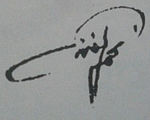Najm Afandi
| Najm Afandi | |
|---|---|

Najm-Afandi-Portrait
|
|
| Preceded by | Bazm Afandi |
| Succeeded by | Sohail Afandi (Religious speaker and scholar) |
| Born |
Mirza Tajammul Hussain 1893 Agra, India |
| Died | 1975 (82 years) Karachi, Pakistan |
| Resting place | Sakhi Hassan-GraveYard |
| Nationality | Indian, Pakistani |
| Ethnicity | Indian |
| Occupation | Urdu Poet, Urdu Writer, Shair-e-Ahle-bait |
| Religion | Islam |
| Main interest(s) | Religious Poetry (Marsiya, Noha) |
| Notable work(s) |
Noha: 'Aey Waey Nahre Alqama' 'Raaj dulara Zehra ka' Books: Kainat-e-Najm, Khosha e Anjum, Huan Najm,Rubaiyat Najam Afandi |
|
Students
|
|
|
Influenced by
|
|
| Signature |  |
Noha: 'Aey Waey Nahre Alqama' 'Raaj dulara Zehra ka'
Najm Afandi (1893–1975) نجم آفندی was an important Urdu poet of his time who had numerous budding poets as his disciples. He was born in Agra, India in 1893. His father Bazm Afandi was himself a well-known poet of Bazm's time. The following verses are from Bazm's ghazal :
Ek shab arsh pe mahbuub ko bulvaa hi liyaa
Hijr voh Gham hai Khuda se bhi uuthaaya na gayaa
Najm Afandi was born in Agra, in the year 1893. He moved to Hyderabad, Deccan at some point in his life. He started writing poetry early in his life and continued to do so for 65 years. His nazm durr-e-yateem was immensely popular, which he wrote while he was only 15 or 16 years of age. He experimented with various genres of Urdu poetry. Najm had in the later part of his life dedicated himself to writing marsiya, salaam, manqabat and qasida. Although he wrote numerous ghazals and nazms, because of the religious nature of his poetry and the issues he dealt with, he was known as 'Shair-e-Ahle-bait.' An example of one of his religious verses is:
Sha'ir hoo jinka Najm woh hain wajah-e-kainaat
Mumkin hai ta-abad mera naam-o-nishaan rahe
Long before Progressive Writers Movement came into existence his poetry dealt with the issues and themes which were the hallmark of the movement. 'Kisaan', 'Mazdoor ki Awaz', 'Hamari Id' are few poems of that era. He greatly influenced the coming generation of poets who adopted marsia, salam, qasida and other similar genres of poetry in Urdu. Muntaqim Haideri Saithly consider him as his Ustad (teacher). He published 5 Diwan of poetry; Mah-e-Wafa, Iqbal-e-Wafa, Jamal-e-Wafa, Ilham-e-Wafa, and he had noted the name of Najm Afandi and Haider Dehlvi as his teachers in each one of them.
Most of his work in Urdu literature remained unpublished during his lifetime. After his death, many people compiled and published his work; others performed them live in Majalis and Mushairas. Allama Zameer Akhtar Naqvi has often quoted his poetry during his speeches along with the poems from Mir Anees and Mirza Dabeer. Some of the books compiling his works are Kainat-e-Najm, Khosha e Anjum, Huan Najm, Rubaiyat Najam Afandi.
...
Wikipedia
